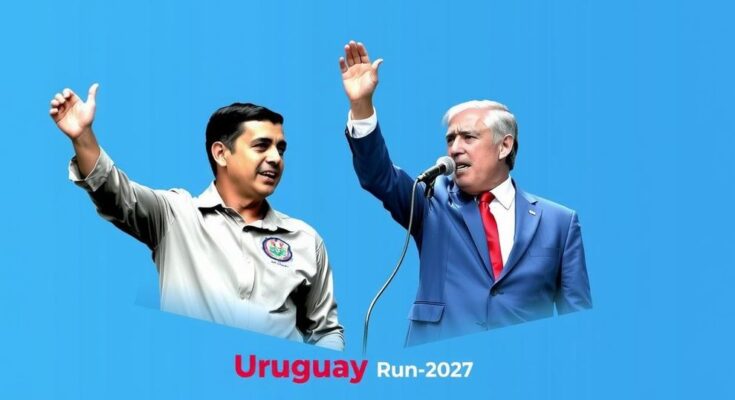Uruguay will hold a second round of presidential voting this Sunday between Álvaro Delgado of the National Party and Yamandú Orsi of the Broad Front. Initial elections saw Orsi secure 44% compared to Delgado’s 27%. The race remains close, with many voters undecided, as candidates address pressing issues like rising crime and economic policies, amidst low campaign enthusiasm.
Uruguay’s upcoming presidential run-off, scheduled for this Sunday, has transformed into a fiercely competitive battle between Álvaro Delgado and Yamandú Orsi. This follows a first-round election where Delgado’s National Party garnered only 27 percent of the votes compared to Orsi’s Broad Front, which secured 44 percent. However, the backing from other conservative parties, like the Colorado Party, allows Delgado to maintain a viable stance against Orsi in this crucial second round.
The recent electoral landscape reflects a nation divided, with both candidates mirrored in close polls yet hindered by low voter excitement. A significant number of voters remain undecided, and analysts attribute this indecision to the candidates’ muted campaign strategies and their mutual agreement on key topics, chiefly concerning taxes and social spending. Unlike in other countries experiencing profound political turmoil, the existential debates observed in regions like the United States are notably absent in this context.
Beyond fiscal policies, a salient concern for both candidates is the rise in violent crime, which has unsettled what was once considered one of the safest locales in South America. The emphasis on addressing crime reflects an urgent necessity for Uruguayan voters as both contenders seek to reassure constituents about their safety and the future of the nation.
Uruguay’s political scene is currently characterized by a fiercely contested presidential election. The Broad Front, a coalition of leftist and center-left parties, previously held power for 15 consecutive years until the 2019 election resulted in a victory for the center-right National Party, led by President Luis Lacalle Pou. This political backdrop of changing parties sets the stage for the run-off election, where candidates Álvaro Delgado and Yamandú Orsi are vying for authority over a culturally progressive nation that legalized abortion, same-sex marriage, and marijuana sales. Public sentiment reflects a general apathy toward traditional campaign issues and highlights the emerging challenge of crime in the country’s safest regions.
The impending run-off election in Uruguay stands as a crucial voter engagement moment that exposes the candidates’ capability to galvanize support amidst a backdrop of political apathy and pressing safety concerns. With a tightly contested race, the focus on crime and economic stability reveals the underlying tensions within the electorate. As both Álvaro Delgado and Yamandú Orsi prepare for the vote, their ability to connect with undecided voters will prove instrumental in determining the future direction of the country.
Original Source: www.scmp.com




